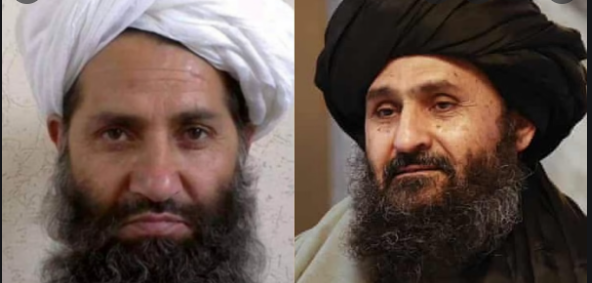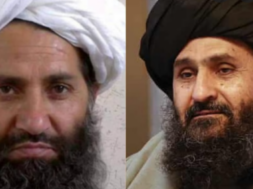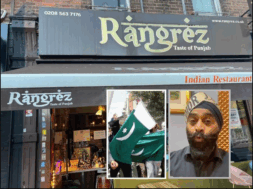
Afghanistan: Amid rumours of top leaders’ fate, Taliban appoint deputy ministers
Virendra Pandit
New Delhi: While the Afghans, and the world, speculated about the death of two of top Taliban leaders—supreme spiritual leader and head of the Islamic Emirate of Afghanistan Hibatullah Akhundzada and Deputy Prime Minister Mullah Abdul Ghani Baradar—the Islamist militia on Tuesday announced a list of “deputy ministers” in Kabul.
On September 7, the Taliban’s 33-member “interim government” was formed with “acting” PM Mullah Muhammad Hasan Akhund, and two Deputy PMs Abdul Ghani Baradar and Moulavi Abdul Salam Hanafi, an Uzbek leader. Only three members of this Cabinet were non-Pashtuns. And 17 of the 33 are on the UN’s terror list.
On Tuesday, government spokesman Zabihullah Mujahid announced the all-male list of new ministers, indicating the Taliban will continue their old policy of excluding women and minorities. He said the government will include women, minorities, and professionals “over a period of time,” but gave no timeframe.
That women will remain excluded from public life became clear when the Ministry of Education made no mention of girls being allowed to resume classes when the schools were opened for boys recently.
Meanwhile, speculation was rife in Afghanistan and beyond about the fate of Akhundzada and Baradar.
While Akhundzada was allegedly killed, Baradar was taken hostage in an intra-Taliban factional power struggle in which Pakistan-supported Haqqani Network, the Pashtun-majority part of the Taliban, prevailed.
According to the magazine, in the recent clash during the government formation talks between the Baradar faction and the Haqqani Network, Pakistan’s ISI chief, Lt. Gen. Faiz Hameed, ensured the hard-line Haqqanis emerged powerfully and cornered all key positions in the government.
The clashes in early September saw “furniture as well as large thermos flasks full of hot green tea thrown around”, said David Loyn in The Spectator. There were unconfirmed reports of a shootout as well.
At one point during the meeting, Haqqani Network leader Khalil-ul-Rahman Haqqani rose from his chair and punched Baradar, who had pushed for an “inclusive” cabinet including non-Taliban leaders and ethnic minorities, to make it more acceptable to the world and secure global recognition for the new government.
The two leaders’ bodyguards also entered the fray and opened fire on each other, killing and wounding a number of them, the reports said.
Baradar was said to have been hospitalized thereafter. He disappeared for a while and resurfaced in Kandahar where he met his supporting tribal leaders. He was also forced to release a video message on the state-run TV network controlled by the Taliban. The message “looked like a hostage video”, The Spectator reported.
About Akhundzada, the British periodical said his whereabouts remain unknown. “He has not been seen or heard from for some time, and there are many rumors that he is dead.”
The Taliban and Haqqani groups merged around 2016. Both Akhundzada and Baradar were in Pakistani prisons from where the latter was released in 2018 to facilitate talks with the US in Doha, Qatar.
After taking control of Kabul on August 15, Baradar tried to project a moderate image of the Taliban, but the Haqqanis pressed continued hard line, including suicide attacks. Khalil ur-Rehman Haqqani, Afghanistan’s minister of refugees, is on the United Nations sanctions list and has been linked to its military operations.
The Haqqanis, groomed by the Pakistani security apparatus are products of the Darul Uloom Haqqania madrassa near Islamabad.
The Cabinet of the “interim government”, announced on September 7, included no one from outside the Taliban, with nearly 90 percent of spots going to ethnic Pashtuns from the group. Members of the Haqqani family received four positions, with Sirajuddin Haqqani, leader of the Haqqani Network who is on the US FBI’s most wanted list for terrorism, becoming an acting interior minister.
Over the past week, the Taliban rejected reports of a factional clash. Baradar appeared on state-run television on Thursday to deny rumors he was wounded or even killed. But he was not present on September 12 to welcome Qatar’s foreign minister Sheikh Mohammed bin Abdulrahman Al-Thani, and he also missed the Taliban’s first cabinet meeting this week.
He brushed off speculation over his absence during the visit of the Qatari delegation, where other Afghan Cabinet members, including the Haqqanis, were present. Qatar had hosted Baradar for several years and facilitated negotiations with then US Secretary of State Michael Pompeo to end America’s longest war.
Interestingly, Baradar, Deputy PM, gave a flimsy reason for his absence!
“I wasn’t aware of the visit of the Qatari foreign minister. I was traveling during his visit to Kabul, and I could not shorten my trip and return to Kabul.”














